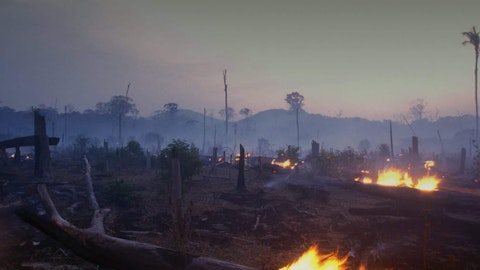Perspectives

Devastating forest fires like those in Australia, the Amazon, Indonesia and Congo move in and out of the headlines – but they keep burning, affecting people, economies and nature, driven by and worsening the climate crisis.
How we feed, fuel and finance ourselves is pushing nature to the brink. We’re using resources faster than natural systems can replenish them, and the natural capital that sustains our enterprise and prosperity is in severe decline, posing an existential threat.
Nature loss and climate change are the greatest systemic risks to our global economy. Reinforcing each other – as our Nature of Risk and Global Futures reports highlight – they already cause natural disasters costing more than $300bn per year.
More than two billion people face threats to their livelihoods. And by 2030, more than 100 million people could fall back into extreme poverty due to climate change, while over 200 million could be displaced by more frequent and severe climatic disasters.
Yet despite the overwhelming evidence that nature and people are in serious trouble, and that we have around a decade to avert climate catastrophe, we are all but sleepwalking into crisis.
A little less conversation, a little more action
Recently, there have been some promising moves by business on climate change and nature loss.
Last September, at the Climate Action Summit in New York, asset owners now responsible for more than $4tn committed to carbon-neutral portfolios by 2050 through the Net Zero Asset Owner Alliance, a major step in aligning global finance with the Paris Agreement’s maximum 1.5°C warming target.
In addition: 230 institutional investors called for action on deforestation; 130 banks holding $47tn in assets and representing a third of the global banking sector signed up to the UN Principles for Responsible Banking; and, following 181 CEOs committing to delivering value to all stakeholders rather than only to shareholders, 19 companies launched a new initiative to protect and restore biodiversity in their supply chains and product portfolios.
Then, despite political failings, December’s climate conference in Madrid saw more positives from the private sector. Notably, 631 institutional investors managing $37tn in assets called for delivery on the Paris Agreement, accelerating private investment in the low-carbon transition.
While governments, business and financial institutions are waking up to the macroeconomic risks posed by nature loss and climate change, we need to match commitments with real action
This January, the new Davos Manifesto called for a better kind of capitalism which engages all stakeholders in ‘shared and sustained value creation’. And with new analyses reinforcing the financial risk of nature loss and highlighting that $44tn in economic value generation – over half of global GDP – depends on healthy natural systems, the World Economic Forum Annual Meeting saw a number of world leaders supporting the call for an ambitious, apex goal to reverse nature loss by 2030. This set a new ‘compass’ for global conservation akin to the 1.5°C temperature rise limit for climate change.
Today, almost half of global GDP is now generated in places where authorities have set, or are proposing to set, a target of bringing carbon emissions to net zero in or before 2050. Yet while governments, business and financial institutions are waking up to the macro-economic risks posed by nature loss and climate change, we need to match commitments with real action.
Nature-based solutions have the potential to deliver 30% of the progress we need on climate change by 2030, and can also help reverse nature loss – but they currently receive only about 2.5% of public climate financing. Without a dramatic shift beyond business as usual and the pursuit of short-term reward, the natural systems upon which we depend will collapse.
Natural returns
While its true value is priceless, nature provides services to the global economy. Pollinators, for example, contribute at least $235bn to global food production, while goods and services from our oceans alone are worth about $2.5tn. And the business case for investment in nature is clear. For an annual cost of $5–10bn, conserving marine stocks could increase annual seafood industry profits by more than $50bn, while protecting coastal wetlands could save the insurance industry billions through reducing flood damage loss.
Compared with business as usual, climate-smart growth could deliver at least $26tn in economic benefits through to 2030, while a shift to more sustainable agriculture, combined with forest protection, could deliver over $2tn per year. And pursuing the Sustainable Development Goals (SDGs) could generate economic opportunities in food and agriculture, energy and materials, cities, and health and well-being worth at least $12tn by 2030.
How can companies lead the fight against climate change?
A threefold approach can help companies step up to the challenge.
First, companies can commit to reversing nature loss and restoring natural systems. While science-based targets for nature are under development, companies can already set greenhouse gas emission reduction targets in line with climate science, and adopt a ‘no regrets’ approach to nature, assessing natural capital impacts and dependencies.
In addition, banks, insurers and investors can adopt policies to protect natural World Heritage sites, employ the new ENCORE Tool to assess and integrate natural capital risks, implement the recommendations of the Financial Stability Board’s Taskforce on Climate-related Financial Disclosures, and support the disclosure of nature-related impacts and the establishment of a Task Force for Nature Impact Disclosure.
Second, companies can take action for nature by halting land conversion, investing in key production landscapes, and developing scalable ‘solutions’ to nature loss and restoration in line with the Accountability Framework. Just 100 companies could prevent roughly ten million metric tons of plastic waste, and the ReSource: Plastic platform can help them turn commitments into meaningful action across sectors and supply chains.
Investors in particular can collaborate with the new Dutch Fund for Climate and Development and invest in nature-based solutions that help developing countries build climate-resilient economies. And responding to water-related risks and opportunities, banks can realize commercial value by financing assets that help mitigate water risk.







